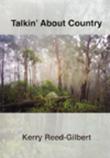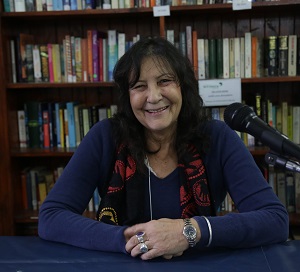AustLit
-
Authors: Estelle Castro-Koshy and Kerry Reed-Gilbert
-
Estelle Castro: How did you become a writer?
Kerry Reed-Gilbert: That’s actually a bit of a hard one. I think I’ve always been a writer. But for me, really, I started writing in 1993. I used my writing as a healing tool. I actually wrote before that. I had a bit of a married life that was not so great. I was actually writing then. One day I wrote a song and it was about my relationship with my ex. He did not like it, so he ripped it up. So I then stopped writing. Then I got divorced. Again, as I said, I started to use the writing as a tool. I always loved writing, always wanted to do it, been into it, and I guess with my father being Kevin Gilbert… it might be a bit natural there. So I got divorced and then I came to Sydney. I found I had all those emotions, that I needed a way to let it out. The writing for me was that best tool.
-
EC: And you started by writing poetry?
KRG: Poetry was the easier. Remember, I am… not what you call a greatly educated person. So I came out of school with my high school certificate, you know, year 10. And when I was going to school it was like, ‘you’re a Blackgin’, or, ‘all you’re good enough for… is to be a cherry picker and to be some man’s punching bag’, basically. So poetry was very easy. It was very easy to pick it up as a tool, because of your literary skills. You did not have to use those great big words, those words that I could never pronounce, or could never spell. So it was just a very natural form for me to do.
-
EC: And at the same time, with the repetition and the words that you’re using, there is always a melody that reminds the reader of orality. Is it what you tried to do, or is it how it came?
KRG: It just comes. There is no rhyme or reason. It just works. I am very lucky. There’s a lot of my poems… like the poem ‘Responsible’. I wrote that in 5 minutes. I never had to make an edit. ‘Reconciliation’… I wrote that in 2 minutes, and I never had to change a word. ‘Treaty’… It’s just the format that it comes out. So, I’ve been lucky. And I think that it is that oral tradition. We’ve all got it in us. I think we just have to allow it to come out.
-
EC: When you performed at the UTS1 Black poets’ corner, it was like a song. It was a real performance. Some people read poetry but yours was a real performance.
KRG: Oh, thank you. I am writing my autobiography at the moment and Kate Grenville − she was one of my… like… mentors, in these workshops we were doing − she said my writing has got a zing. And I think that oral tradition allows us to make the words sound like music, and to make it flow. So, yes, I think that it’s that sweet melody that we do. Thank you for the compliment.
-
EC: How is it to write your autobiography?
KRG: It’s very hard, because it’s writing about those emotions. It’s not saying that some of that poetry isn’t emotional and isn’t hard. You’ll see that some of my poetry is angry. You’ll see that some of it is very erotic. So you’ll see all those different emotions in me. Whereas writing my autobiography is very emotional because… I don’t know. If people do know a bit about my life, it hasn’t been an easy life. I am not one of those that were brought up with a silver platter. I am a fruit picker by trade. That’s where I come from, out there in the paddocks. Again, if you look at the history of my father, I’m Kevin Gilbert’s daughter. That impact of my father’s going to jail, all that kind of stuff, and what happened to me and my brother when my father went to jail. So you can imagine the emotions that need to be addressed. I was lucky enough last year, I was lucky to get the first Aboriginal fellowship to go to Art Omi2 and it was such an honour. But again… I actually wrote a short piece of my autobiography as a short story. I am there with all these flash writers and lawyer writers, and I am just this little Blackgin from the bush. They’ve got four books out and I’ve got a couple of poetry books. I actually went as a poet, but I thought I’ll just print out this little autobiography piece and the mob over there, the director Ben especially, said ‘you have to write your autobiography’. Now, the purpose of me going there wasn’t to write my autobiography but I thought I would have a good opportunity there because of their support. I knew how painful it would be. To do that. I was brought up on country and western music and Elvis Presley; so I’m an Elvis’s woman. And I wanted to go to Elvis’s house in Memphis. And Ben, he goes to me: ‘you’re not allowed to go to Elvis’s house unless you have fifty pages of your autobiography written for me.’ I went and wrote the fifty pages because I wanted to go! But I actually cried. I think for every sentence that I wrote I probably cried a hundred tears, because it was just so traumatic to write it. So it’s been like that. You read the poem I wrote for my mother, ‘God’s been good’, and I think you get a guess of what my life was like. And why even that poem was emotional to write.
-
EC: Did some writers influence your writing? Did your father’s writing influence your writing?
KRG: Yes. My father died in 1993. He was an amazing man, an amazing writer. I don’t know if people know that when my father went to jail, he went to jail when he was 22-23. When he went to jail, he went to jail with fourth class education because in those days, Blackfellas did not get taught. I don’t think it was the sole purpose, but I think that one of the reasons that I wanted to write was to carry on his work. I think that’s important. I know in my heart that my old man is pretty proud of me because he knows that I’ve done that. So I think that’s really, really good. But yes, he has influenced me because he used his words to get a message out. And the message was about the reality of inside black Australia for Aboriginal people. We’re in 2004, and we still haven’t got human rights in our own country. We’re still facing the most racist government here. Somebody’s got to do it, I guess.
-
EC: In the first book, you call for a treaty and sort of dismiss reconciliation. It seems in the second one you’re a bit more…
KRG: Yeah… I guess I was hoping that through the reconciliation process, something would have happened. But, the reconciliation process didn’t work in this country. And how you know it did not work, it’s because the Howard government got in. Australia spent 10 million dollars on a ten-year process for reconciliation, and we got the most racist government. And not for one term.
-
EC: You’ve also compiled and edited two collections of poetry. Is it because you think it’s important that an Aboriginal person compiles and edits Aboriginal poetry as a tool for self-representation?
KRG: Yeah… When you talk about self-determination and self-management for Aboriginal people, even in the words of poetry, even for focus of poetry or writing, you’ve got to allow that to happen. For me to be able to take a collection of Aboriginal people’s works – men and women – and to be able to do that as an Aboriginal editor, I think that’s an achievement in itself. I think the days have gone when we had non-Aboriginal people do that. The days of mission management are over. We’ve got to have the power now to do those selections, these processes.
-
EC: Who do you think is your primary audience?
KRG: I would like to think that we’re aiming at our own mobs as well. But the reality is that our target group is non-Aboriginal people, because unless they’re willing to hear the stories, to read the stories and to know the stories, there’s never going to be any changes here in this country for Aboriginal people. So the main audience is non-Aboriginal people, although, as you know in Talkin’ About Country, there’s a few poems there written for Aboriginal people as well. So I think overall it’s the wider community and Aboriginal people, and the focus I guess is non-Aboriginal people. Even in Australia there is this common belief that Aboriginal people can only write autobiographies.
-
EC: You’ve got one poem called ‘Free Nelson Mandela’ and you toured in South Africa. Is your poetry also for an international audience?
KRG: Yeah exactly. Totally babe, it is for an international audience, because, again if you look throughout the world at Indigenous peoples, some Indigenous people have got treaties. But does that mean that they’ve got human and equal rights in their own country? Look at South Africa: Yes, Nelson Mandela did get free, but look at what’s happening in his own country.
-
EC: And you’re painting or you’re taking—?
KRG: Photos. I am a photographer.
-
EC: Is there a continuity between the different art works?
KRG: Yes… Again, it’s the same as for poetry. It’s about trying to convey messages. One of the things is about trying to make the non-Aboriginal community understand that you can’t live in a country and call a country your own if you don’t know the country, if you’re not responsible for the country. Now, part of this responsibility is knowing the stories, knowing the history, it’s recognising that Aboriginal people are the original owners of this land. That no matter where I walk – whether it’s in a building like this… – I stand on Aboriginal land. It’s all that kind of stuff. With me, I try to use the combination of visual as well as the spoken and I think that’s really important. I think that we have to use whatever art work we can to get our messages across.
-
EC: Have you got any favourite writer or writers?
KRG: Oh yes. You’ve got Anita. The reality for me is that without Anita’s support, all that and all that friendship and love she’s given me, my writing might still be in the drawer. I don’t know if I would have ever got confidence enough without her support to be able to take it out of the drawer and start performing. You’ve got Melissa, you’ve got Yvette, you’ve got all those writers. You’ve got Oodgeroo, you’ve got my father of course. Kim Scott. If you ask non-Aboriginal people how many Aboriginal writers are out there… I don’t know, they would probably say Kevin Gilbert, Oodgeroo Noonuccal – otherwise known as Kath Walker because some don’t know her name. You’ve got old Uncle Jack Davis from Western Australia. Their knowledge would be very limited. But we’ve got a great showcase out there, and I think that’s important for people to start learning there is an Aboriginal voice in this country.
[While recording poems from Talkin’ about country]. There is a common belief that Kerry Reed-Gilbert can only write political poems. I guess one of the purposes of entitling a section ‘Love Poems and others’ in this book… I wanted to share with everybody that I can write more than political works, that I am also a person, a woman, a human being with feelings and emotions the same as everyone else.
I am one of the lucky ones. I was never stolen. So I always knew where I was, where I come from, who I am, where I belong. As often for lighter-skin Aboriginal people, people often say to us, ‘you could be white. Why aren’t you?’ The first thing I always say to them is: Why would I want to be? Why would I want to deny my family? My history, my heritage? Why would I want to do that? So, I am very proud of who I am. It’s very much my essence.
And I am one of the lucky ones. For some of the other mobs, they may never be able to find that essence. And I think that’s the most valuable gift that we are given as Aboriginal people, of that, of knowing who we are, where we come from. So yeah, that’s important.
This interview was conducted on 08/12/2004.
-
 Cover image courtesy of Kuracca Communications.See full AustLit entry
Cover image courtesy of Kuracca Communications.See full AustLit entryTalkin' About Country follows her previous works, Black Woman, Black Life (Wakefield Press, 1996), Message Stick (IAD Press, 1997), and The Strength of Us Women: Black Women Speak (Ginninderra Press, 2000).
(...more)
You might be interested in...





